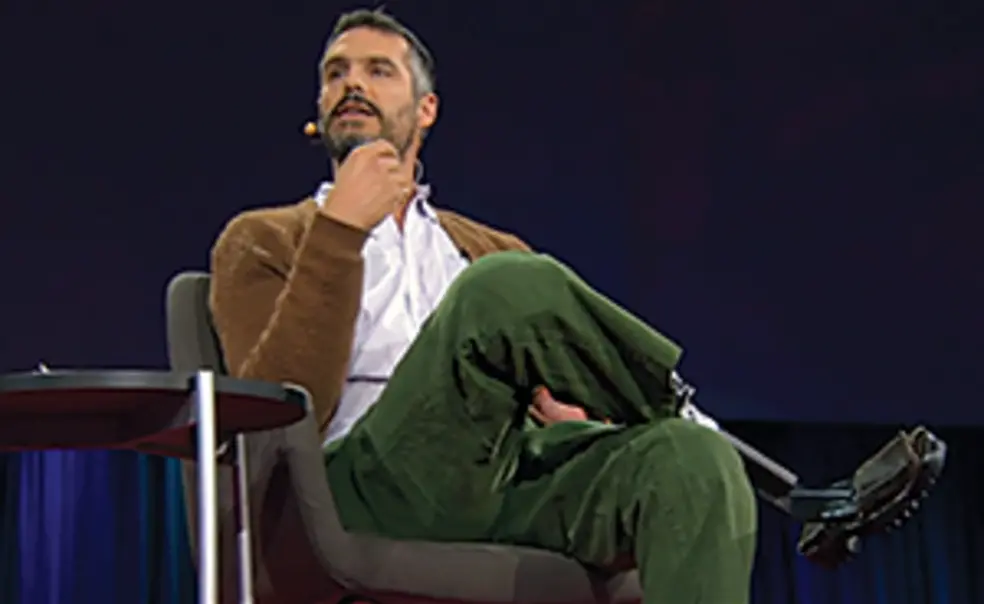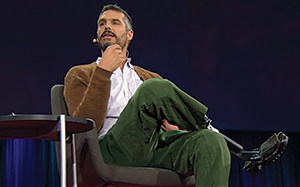Talking the Talk: 7 Notable TED Talks by Princeton Alumni
Palliative-care doctor B.J. Miller ’93’s recent TED Talk, “What Really Matters at the End of Life,” has been viewed more than 1 million times.
Below, browse our playlist of popular TED videos by Miller and other Princeton alumni.
Susan Cain ’89: The Power of Introverts
Susan Cain ’89 is the author of the best-seller Quiet: The Power of Introverts in a World That Can’t Stop Talking. In her highly relatable TED Talk, she discusses the emphasis society places on extroversion and argues that this culture is problematic because of the limits it places on the quiet. Our workplaces and classrooms are designed for extroverts and their need for high levels of stimulation — through classroom desks organized into pods, offices without walls, and constant group brainstorming sessions. In this culture, introverts are constantly pushed to abandon their true selves and be more outgoing, which generates feelings of guilt and may hinder creativity. By calling on examples from our history of transformative leaders and her own anecdotes, Cain demonstrates the importance of accommodating introverts’ desired levels of stimulation in order to benefit from their creative solutions and leadership abilities. With introverts comprising up to half of the population, there is much to gain by shifting our culture and recognizing the power of speaking softly.
Seth Shostak ’65: ET Is (Probably) Out There — Get Ready
Astronomer Seth Shostak ’65 is a researcher at the Search for Extraterrestrial Intelligence (SETI) Institute. In his witty TED Talk, he predicts we will find extraterrestrial life within the next two-dozen years. He knows this sounds crazy to most people, but he points to evidence of the exponential improvement of our search technology and the sheer amount of real estate available in the galaxy as two factors that are hard to write off. Sure, we have not yet been able to communicate with extraterrestrials, but with the number of planets in our universe it would be a statistical miracle for Earth to be the only one with life. Shostak predicts the societies we encounter would be highly advanced, and this would allow us to see into our future as a society.
Amy Cuddy *05: Your Body Language Shapes Who You Are
Amy Cuddy *05 is well-known for her contributions to the field of social science (see PAW’s April 2, 2014, issue) and her TED Talk about body language ranks among the most popular of all time on the site, with more than 28 million views. Cuddy outlines how our bodies can affect our minds and ultimately our success. She introduces the simple science of “power posing,” positioning the body dominantly, as a way of influencing how we see ourselves. By pulling from experimental and physiological evidence, Cuddy proves how a two-minute posing session before a job interview can truly affect the outcome of the event. As she argues, it is possible not only to “fake it till you make it,” but to really becomepowerful.
Sarah Bergbreiter ’99: Why I Make Robots the Size of a Grain of Rice
Sarah Bergbreiter ’99, an associate professor at the University of Maryland, is a big player in the field of microrobotics. Intrigued by the incredible capabilities of ants and other insects, she and her team work to build tiny robots that combine functions such as mobility, sensing, and group behavior. Bergbreiter’s centimeter and millimeter-sized devices could have remarkable uses in the future. She predicts a future in which microrobots can search the rubble of a disaster for survivors, inspect a bridge to make sure it is not at risk of collapse, and be used in operations so patients do not need to be cut open.
Dan Gilbert *85: The Surprising Science of Happiness
Dan Gilbert *85 is a Harvard professor, author, and expert on the science of happiness (see PAW’s Nov. 4, 2009, issue). With surprising evidence, he challenges our widely held assumption that happiness is something to be achieved. Gilbert proves that we can actually synthesize happiness, even when we do not get what we want. He employs the findings of many studies and psychological experiments to prove his counterintuitive assertions. Both lottery winners and paraplegics report equal levels of happiness a year after the events that changed their lives, which Gilbert cites as evidence that many of our conceptions about the impact of events on our happiness are overblown. Not all things good and bad are exactly the same, but Gilbert aims to show that we have a much greater capacity than we think to be happy with the things we cannot change.
Edward Tenner ’65: Unintended Consequences
In his TED Talk on the unintended consequences of innovation, Edward Tenner ’65 walks us through the history of this concept and illuminates many examples — from the effect of chopsticks on the teeth of the Japanese public to the discovery of penicillin. Tenner demonstrates the gap that has been growing between our capabilities for invention and our foresight of unintended consequences. He argues for the importance of being conscious of these possible unintended consequences because they are often the essence of our progress. Tenner recognizes those in history who left their intended careers to put their creativity to better use and encourages viewers to do the same. As he says, “Chaos happens; let’s make better use of it.”
B.J. Miller ’93: What Really Matters at the End of Life
B.J. Miller ’93 is a hospice and palliative-care physician at the Zen Hospice Project in San Francisco. Having navigated his own close encounter with death and hospital care (see PAW’s Feb. 5, 2014, issue), he offers insights into the ways in which our health care model could shift to be more patient-centric, rather than disease-centric, and allow people to experience a more dignified death. Miller speaks poignantly about the needless suffering many people experience in hospitals due to the lack of stimulation to their senses and outlines ways in which care centers can become more humane places to live and die. Ultimately, Miller suggests the importance of well-being, dignity, and figuring out what is best for ourselves in order to live a better life.
Looking for more? Five additional TED Talks by Princetonians
Tim Ferriss ’00: Smash Fear, Learn Anything
Jeremy Kasdin ’85: The Flower-Shaped Starshade That Might Help Us Detect Earth-Like Planets
Doris Kim Sung ’86: Metal That Breathes













No responses yet